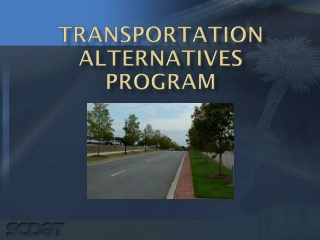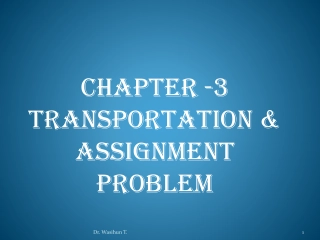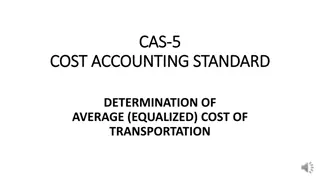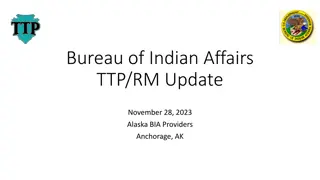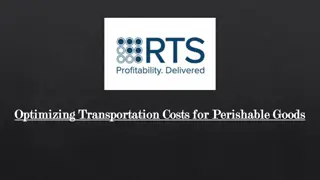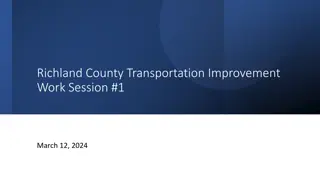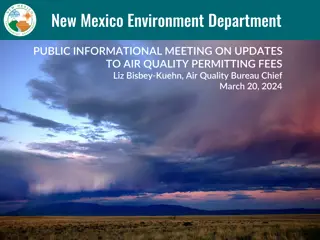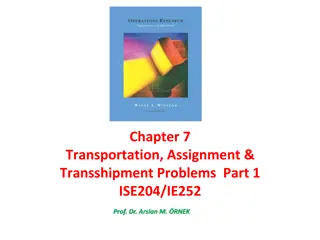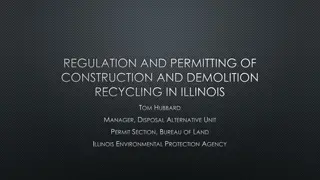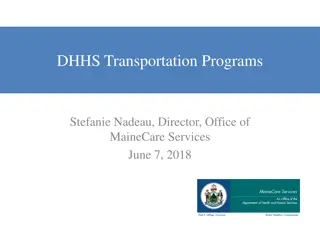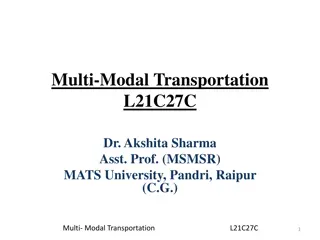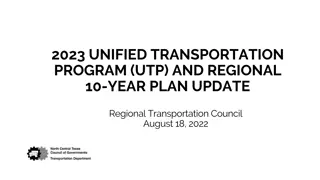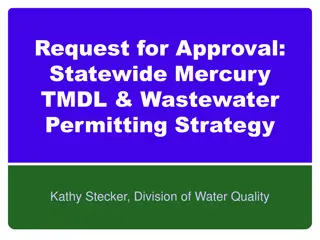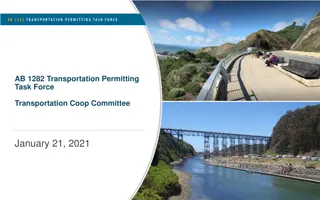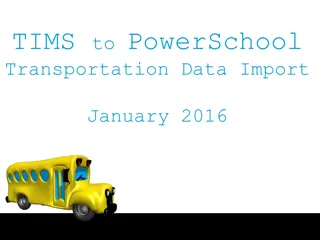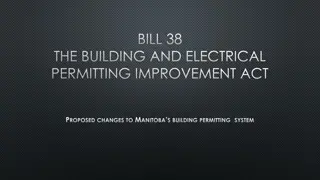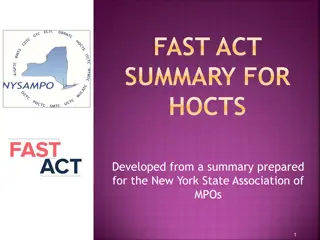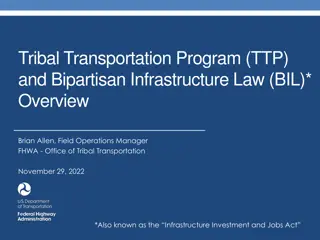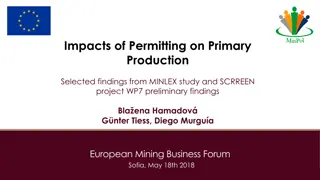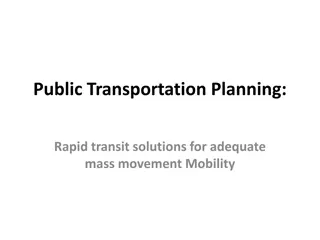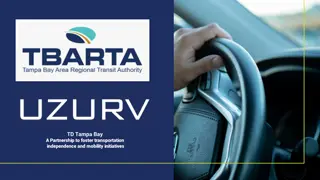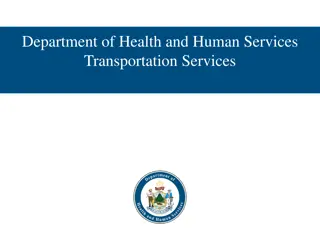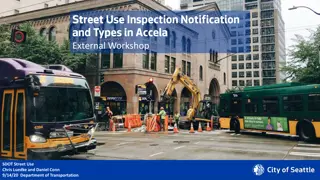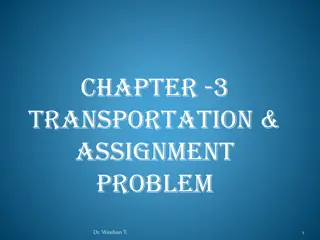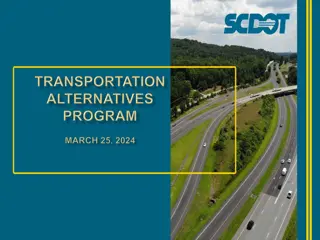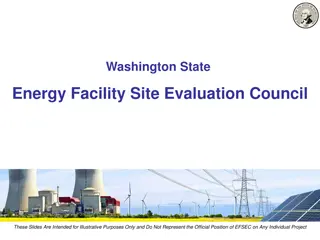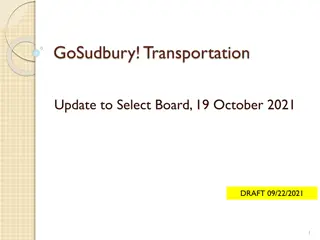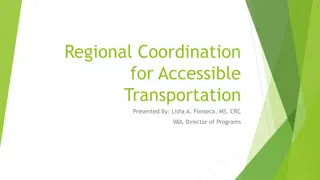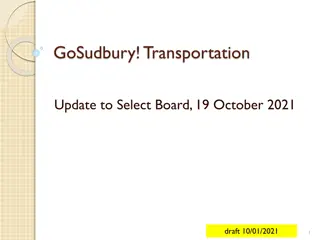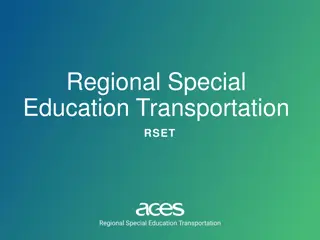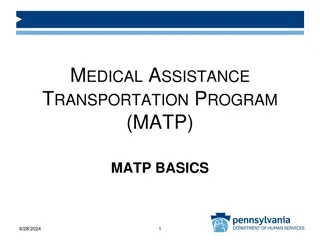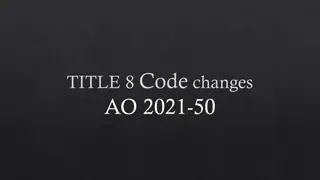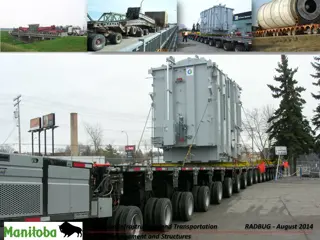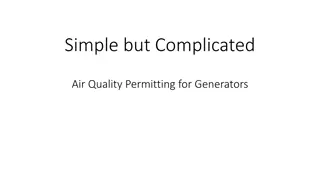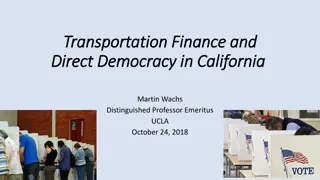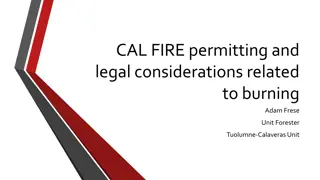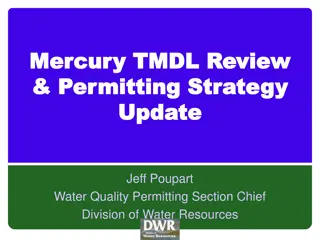Funding Opportunities for Non-Motorized Transportation in South Carolina
The US Department of Transportation's Federal Highway Administration provides funding to South Carolina through the Transportation Alternatives Program (TAP) to support non-motorized transportation initiatives. Local governments, schools, and other entities can partner with the South Carolina Depart
1 views • 21 slides
Transportation & Assignment Problem Overview
The transportation problem involves optimizing shipment costs from multiple sources to multiple destinations with known supply and demand constraints. This chapter discusses the characteristics of transportation problems, key assumptions, and how to formulate the transportation model. Dr. Wasihun T.
0 views • 64 slides
Enhancing Transportation Performance Management through TSMO Collaboration
Advancements in technology and evolving customer needs are driving changes in transportation management. Transportation Systems Management and Operations (TSMO) offers strategies to optimize operational performance, complementing traditional capacity projects. Collaboration between TSMO and Transpor
1 views • 77 slides
Cost Accounting Standards for Determining Transportation Costs
Understanding the importance of transportation costs in procurement and distribution, this guide outlines the standards for determining average costs, separation of transportation costs in accounting records, objectives for maintaining cost uniformity, components of transportation costs, and treatme
0 views • 11 slides
Update on BIA Transportation Programs in Alaska
The update covers the Bureau of Indian Affairs (BIA) Transportation Programs in Alaska, including funding details for the Tribal Transportation Program (TTP) and BIA Road Maintenance Program. It discusses the current funding status, upcoming appropriations, and maintenance activities on BIA-owned ro
0 views • 10 slides
Understanding Transportation Programs and Trends
Transportation training session led by Megan Johnson, featuring topics such as Transportation Crash Course, Training Opportunities, and Transportation Trends & Updates. Includes discussions on different types of transportation services and their importance for communities.
2 views • 38 slides
Optimizing Transportation Costs for Perishable Goods
In the realm of logistics, the transportation of perishable goods presents a unique challenge. From fresh produce to pharmaceuticals, these time-sensitive commodities require specialized handling and efficient transportation to maintain their quality and integrity. One of the critical aspects of man
2 views • 6 slides
Richland County Transportation Improvement Summary
Richland County's transportation improvement work includes sessions on project principles, funding options, project costs, and guidelines for utilizing the transportation penny. The focus is on addressing transportation needs, project prioritization, funding challenges, and division of funds for var
0 views • 19 slides
Updates on Air Quality Permitting Fees in New Mexico
The New Mexico Environment Department is holding an informational meeting discussing the need for fee increases in air quality permitting. Reasons include the rise in complexity and number of oil and gas permit applications, increased workload requiring more staff and resources, and the benefits of
0 views • 10 slides
Transportation Problem Modeling in Supply Chain Management
This content discusses the formulation and solution of transportation problems in the context of supply chain management, using a specific example of wheat transportation between grain elevators and mills. It covers the characteristics of transportation problems, linear programming model formulation
3 views • 55 slides
Transportation Planning and Data Collection Insights
Understanding transportation planning involves various stages such as data collection, study area definition, and selection of external cordon lines. Collecting data on existing travel patterns, transport facilities, and land use is crucial for formulating effective transportation plans. Defining th
0 views • 27 slides
Regulation and Permitting of Construction and Demolition Recycling in Illinois
Tom Hubbard, the Manager of the Disposal Alternative Unit Permit Section at the Illinois Environmental Protection Agency, sheds light on the classification, regulation, and permitting processes for Construction and Demolition (C&D) recycling in Illinois. The article explores the definitions of Clean
1 views • 6 slides
Maine DHHS Transportation Programs Overview
The Maine Department of Health and Human Services (DHHS) oversees various transportation programs aimed at providing non-emergency transportation services to low-income, child welfare-eligible, and Section 17-eligible individuals. These programs are managed through regional brokerage systems, with b
3 views • 5 slides
Understanding Multimodal Transportation in Logistics
Multimodal transportation involves using multiple modes of transportation for logistics and freight processes. It utilizes a combination of air, road, rail, water, and package carriers to efficiently move goods. Unlike intermodal shipping, multimodal shipping allows for flexibility in handling cargo
2 views • 119 slides
Regional Transportation Council's 2023 Unified Transportation Program Update
The Regional Transportation Council discussed updates to the 2023 Unified Transportation Program, focusing on Category 2 funding discrepancies, proposed project adjustments, development principles for the 10-Year Plan, and regional funding allocations for 2017-2023 UTPs. The plan emphasizes performa
1 views • 14 slides
Statewide Mercury TMDL & Wastewater Permitting Strategy Overview
Statewide Mercury Total Maximum Daily Load (TMDL) program implemented in North Carolina has aimed at a 67% reduction in total mercury loading since 2002. The Wastewater Permitting Strategy has successfully resulted in a 99% compliance rate among facilities, ensuring low mercury contributions. Monito
0 views • 22 slides
Advancing Transportation Permitting with AB 1282 Task Force
AB 1282, a legislation passed in late 2017, established the multi-agency Transportation Permitting Task Force to streamline the process for developing transportation projects. The task force aims to reduce permit processing time, set reasonable deadlines for approvals, and enhance the certainty of p
3 views • 4 slides
Importing TIMS Transportation Data into PowerSchool
Explore the process of extracting, formatting, purging, and importing TIMS transportation data into PowerSchool for efficient management of student transportation information. This includes creating TIMS extracts, updating bus stop information, and optimizing transportation planning through geocodin
2 views • 43 slides
Proposed Changes to Manitoba's Building Permitting System
Bill 38, "The Building and Electrical Permitting Improvement Act," introduces the Permit Dispute Resolution Act in Manitoba. This act allows for appeals to an adjudicator regarding building code compliance and performance standards under the Buildings Act. The adjudicator can confirm, vary, or set a
1 views • 6 slides
Overview of FAST Act for Transportation Planning
The FAST Act, passed in 2015, authorizes federal programs for transportation development with a focus on surface transportation. It extends funding through 2020, totaling $304.7 billion. The Act aims to enhance resiliency, reliability, and stormwater mitigation in transportation systems. Planning fa
2 views • 10 slides
Tribal Transportation Program & Bipartisan Infrastructure Law Overview
The Tribal Transportation Program (TTP) and Bipartisan Infrastructure Law (BIL) provide funding for essential transportation projects in Tribal communities. The TTP Bridge Fund, Safety Fund, and High Priority Projects aim to improve infrastructure and safety. The BIL funding for FY22-FY26 totals $3.
1 views • 13 slides
Impacts of Permitting on Primary Production: Insights from MINLEX Study and SCRREEN Project
This study delves into the impacts of permitting on primary production in the European mining sector. It highlights the legal framework, permitting regimes, and the need for effective procedures. The research covers diverse aspects such as mineral ownership, authorities involved, and examples like t
0 views • 15 slides
Efficient Public Transportation Planning for Mass Mobility
Rapid transit solutions like high-capacity public transportation systems, including overground rail, underground rail, trams, and BRT systems, play a crucial role in enhancing mass movement efficiency. Factors such as journey time, transport costs, vehicle operating costs, and the benefits of rapid
1 views • 20 slides
TD Tampa Bay - Enhancing Transportation Independence and Mobility Initiatives
TD Tampa Bay partnership aims to increase access to essential services, enhance regional connectivity, and provide on-demand transportation services for transportation disadvantaged individuals in the TBARTA region. The initiative includes innovative solutions like cross-county and evening/weekend t
1 views • 9 slides
DHHS Coordination of Transportation Service Contracts Overview
The Department of Health and Human Services in Maine conducted an assessment of Transportation Services in June 2019. The workgroup identified three main priorities: alignment of Quality and Performance Measures, Safety Measures, and Evaluation of Transportation Services. The first priority involves
0 views • 28 slides
Overview of Accela Launch for Street Use Inspection Notification and Types
Seattle Department of Transportation (SDOT) is implementing Accela as a new permit system to improve permitting and inspection processes for street use. The system aims to provide a transparent and efficient experience for users across departments, with scheduled launch in November. This includes di
0 views • 23 slides
Understanding Transportation and Assignment Problem
Transportation and assignment problems involve optimizing the shipment of goods from various sources to multiple destinations while minimizing total transportation costs. These problems deal with limited supply, known demand, constant shipping costs, and integer quantities. The transportation algori
0 views • 64 slides
Enhancing Transportation Infrastructure Through Federal Funding Programs
The Transportation Alternatives Program (TAP) funded by the USDOT's Federal Highway Administration supports transportation projects in South Carolina based on population categories. TAP funds are allocated to Transportation Management Areas (TMAs), Small Urban Areas, and Non-Urban Areas, prioritizin
0 views • 21 slides
Overview of Washington State Energy Facility Site Evaluation Council (EFSEC)
The Washington State Energy Facility Site Evaluation Council (EFSEC) was formed in 1970 to oversee the permitting process for energy facilities in the state. It serves as a one-stop permitting agency for various permits required for energy projects, making recommendations to the Governor for final d
0 views • 13 slides
Addressing Transportation Gaps in Sudbury: A Livable Community Approach
The Sudbury Transportation Committee, established by the Select Board, aims to enhance transportation in Sudbury to create a livable community. Focusing on inclusivity, equity, and addressing transportation gaps impacting various aspects of livability, the initiative seeks to improve social particip
0 views • 16 slides
Understanding Regional Coordination for Accessible Transportation
This presentation delves into the concept of regional coordination in accessible transportation, focusing on the Regional Transportation Advisory Panel, 5-year regional transportation goals, and the significance of the Safe, Accountable, Flexible, Efficient Transportation Equity Act. It emphasizes t
0 views • 16 slides
Enhancing Livability in Sudbury Through Transportation Initiatives
The GoSudbury! Transportation Update to the Select Board on October 19, 2021 highlights the importance of addressing transportation as a key component of livable communities. The initiative aims to create a safe, secure, and inclusive environment by improving transportation options for residents of
0 views • 26 slides
Regional Special Education Transportation (RSET) Program Overview
RSET, which stands for Regional Special Education Transportation, is an initiative developed by ACES to help districts save money while safely transporting students to out-of-district placement sites. The program benefits districts by reducing transportation costs, addressing parent concerns, and ma
0 views • 13 slides
Understanding Pennsylvania's Medical Assistance Transportation Program (MATP)
The Medical Assistance Transportation Program (MATP) in Pennsylvania provides essential transportation services to access medical care. Governed by state plans and codes, MATP aims to offer access to medical, pharmacy services, chronic disease management, and preventative care. Transportation provid
0 views • 16 slides
Changes in Child Abuse Law: AO 2021-50
This document outlines significant changes in the Title 8 code relating to the abuse of children and vulnerable adults under AO 2021-50. The amendments clarify the levels of intent required for causing or permitting physical injury, decriminalize negligence in permitting child injury, and delete sec
0 views • 9 slides
Innovative Overload Permitting for Heavy Loads in Manitoba
Increased demand for hauling heavier loads in Manitoba has led to the development of innovative overload permitting processes by the Department of Infrastructure and Transportation. Using advanced design and load rating specifications, they approved a superload weighing 363,250 kg (800,830 lbs) for
0 views • 34 slides
Understanding Air Quality Permitting Regulations for Generators
Exploring the complexities of air quality permitting for generators, focusing on regulations in Pinal County for insignificant units and federal rules governing different types of engines. The regulations cover exemption criteria, compliance requirements, and specific guidelines for emergency genera
0 views • 21 slides
Transportation Finance and Direct Democracy in California
Proposition 6 on November 6th has garnered attention, but voters in multiple states will decide on over 250 transportation ballot measures totaling over $55 billion. California, with a longer history and greater funding needs, has been at the forefront of transportation investments, including the us
0 views • 29 slides
Regulations and Permitting for Controlled Burning in California
Understanding the legal considerations and permitting requirements related to controlled burning in California, including the necessary permits, restrictions based on fire conditions, and consequences for unauthorized burning. The Public Resources Codes outline specific rules such as obtaining permi
0 views • 12 slides
Mercury TMDL Review and Permitting Strategy Update for Water Quality Protection
Reviewing the Total Maximum Daily Load (TMDL) of mercury in water bodies, its impacts on aquatic life and human health, and strategies for permitting to ensure compliance with environmental standards. Includes an overview of mercury sources, regulatory approvals, reduction targets, and monitoring co
0 views • 12 slides
